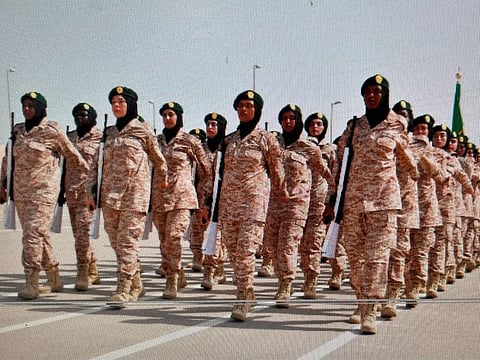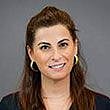How the UAE is empowering women in peacekeeping and security roles
Multitude of career options within peacekeeping efforts explained

Abu Dhabi: The UAE has long championed women’s empowerment, and its efforts are no less visible when it comes to peacekeeping.
Speaking on the 22nd anniversary of the landmark UN Security Council resolution 1325 on Women, Peace and Security, a researcher at the Anwar Gargash Diplomatic Academy (AGDA) in Abu Dhabi has called for more women to consider peacekeeping as a career.
“The UAE has committed more than $2 billion (Dh7.35 billion) since 2016 to various initiatives related to the protection of women in more than 70 countries. [In this way], it has not only committed itself to empowering Emirati women in the UAE, but has also made women empowerment a key component of its foreign policy. No other country in the region has done that,” Dr Sara Chehab, senior research fellow at the AGDA, told Gulf News.

“Unfortunately, women remain severely under-represented in military peacekeeping operations globally. Yet, we know, for instance, that a peace agreement is 35 per cent more likely to last 15 years and longer if women are included in its preparation. While we are starting to see improvements in this regard, we are a long way away from achieving gender parity in the field,” she added.
The UN adopted its resolution 1325 on October 31, 2000 to reaffirm the important role of women in the prevention and resolution of conflicts, peace negotiations, peace-building, peacekeeping, humanitarian response and in post-conflict reconstruction. The resolution also stresses the importance of women’s equal participation and full involvement in efforts to maintain and promote peace and security.
UAE efforts
The UAE adopted its National Action Plan (NAP) on women peace and security in 2021. Since 2019, it has also trained more than 350 military cadets from various countries for various peacekeeping and military roles, through the Sheikha Fatima Bint Mubarak Women Peace and Security Initiative.
“If we look at how the UAE compares to other countries, it ranks first in the Arab and Gulf region, and 22nd globally, with the same rank as Australia, on the Georgetown University Women, Peace and Security Index of 2021 – 2022. What this means is that, out of 170 countries covered by this Index, the UAE is taking a lead role in improving women’s inclusion, security and legal rights by implementing several reforms that empower women,” Dr Chehab said.
Diplomacy training
For its part, the AGDA is also advancing the role of women in diplomacy and peacekeeping.
“AGDA has always been committed to advancing the representation of women in diplomacy. In fact, 60 per cent of our graduates since 2016 are women. We take great pride in advancing ground-breaking research, such as our annual Women in Diplomacy Index, where we map how many women make it to the top ambassadorial posts worldwide,” Dr Chehab said.
The academy has also partnered with the General Women’s Union and the UN Women office in Abu Dhabi to deliver training to 140 female military cadets on topics related to diplomacy, intercultural awareness and communication.
Women’s roles
The researcher, who has been teaching in the UAE for 11 years, explained that women can take up a multitude of roles within peacekeeping efforts.
“They can serve in multilateral missions, in the police force, but also as negotiators, mediators and community representatives during peace processes and national dialogues to end conflicts and wars. We also know that when you have women peacekeepers on the ground, they often times can have access to communities and can solve issues, such as gender-based sexual violence, which men won’t necessarily be able to handle as well,” she said.
By training in peacekeeping, women can also contribute to a field that is seeing much transformation.
“When we speak of women in diplomacy, we can mean different things here. At the most basic level, we’re referring to women who serve in the diplomatic corps, who are employed by ministries of foreign affairs. But since diplomacy is changing and everything is becoming more globalised, we see women ministers and parliamentarians, activists and researchers all doing groundbreaking work and representing their countries in various diplomatic venues. Diplomacy is no longer restricted to the persona of the diplomat – today we speak of space diplomacy, economic diplomacy and even culinary diplomacy! This greater diversity of perspectives and topics means that more women are able to play important roles, even if informal,” Dr Chehab said.
Tracking progress
Through her experiences, Dr Chehab has also found female students among the brightest in the field, and she pursued lines of study that created the AGDA’s Women in Diplomacy Index.
“I read a book back in early 2018 about women’s representation in diplomacy. The book was written by renowned professors, but it was glaring that there was no mention of the Arab world in that book! When I looked for information online about other countries, the information was also missing. It was very surprising to me that no one – except the book authors – was doing this research or talking about this! So I took this to our top management and told them that it’s an issue worth examining. They were very supportive and this is how our annual Women in Diplomacy Index was born,” Dr Chehab said.
“The AGDA is one of the very few institutes that do this kind of research and track the information on a yearly basis. We hope that by doing so, we can really hold people accountable to increasing the number of women in top posts,” she added.



